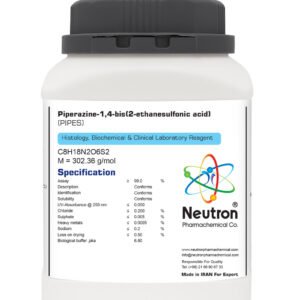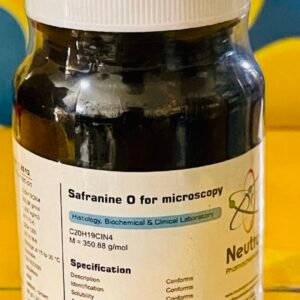بروموکروزول پرپل سلوشن
| Formula | C21H16Br2O5S |
| Molar mass | 540.24 g/mol |
| CAS number | 115-40-2 |
| HS code | 29349990 |
| EC number | 204-087-8 |
| Storage | +15 °C to +30 °C |
| SDS | Available |
| Description | Conforms | ||
| Identification | Conforms | ||
| Appearance of solution | Conforms | ||
| Sensitivity test | Conforms | ||
| Transition Range | Conforms |
Bromocresol Purple solution is a pH indicator solution commonly used in analytical chemistry, microbiology, and clinical laboratories. It exhibits a distinct color change depending on the acidity or alkalinity of the environment, making it useful for visual pH detection and biochemical assays.
🏭⚗️ Production
The solution is prepared by dissolving bromocresol purple powder in distilled water, often with a small amount of ethanol to aid solubility. Typical working concentrations range from 0.04% to 0.1% w/v. The solution must be stored in a tightly sealed, light-protected container, as the dye is light-sensitive and may degrade over time.
🔬 Properties
Bromocresol purple changes color depending on pH: it is yellow below pH 5.2 and purple above pH 6.8, with a distinct transition range between these values. It is a sulfonephthalein dye and binds weakly to proteins or cell membranes. In solution, it appears deep violet to purple under neutral conditions and is stable under normal lab usage.
🧪 Applications
• Analytical chemistry: Used as a pH indicator in titrations and buffer testing, especially in the acidic-to-neutral range.
• Microbiology: Applied in culture media to indicate fermentation activity or acid production by microbial growth.
• Clinical diagnostics: Employed in serum albumin determination and other biochemical assays involving pH-dependent color shifts.
• Educational use: Common in student labs for demonstrating pH changes and acid-base chemistry.
• Staining: Occasionally used in histological staining protocols where pH sensitivity is required for contrast or differentiation.




